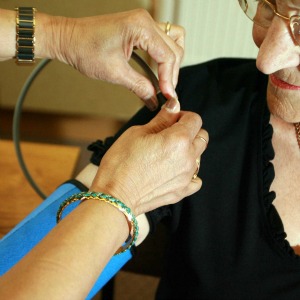Do we continue prescribing BP drugs without review?

A patient with severe hypertension taking regular treatment is repeatedly failing to attend for his review, despite a number of requests from the practice. His usual GP says she is not comfortable continuing to prescribe without any form of monitoring. Should we cancel his medication?

Dr Jessica Garner: Threaten to halt prescriptions
The first rule all of us must abide by when considering patient care is ‘do no harm’. In this scenario the decision has to be made as to what would cause greatest harm to the patient: allowing hypertensives to be continued in the absence of monitoring or stopping them?
My concern would be prescribing medications such as an ACE inhibitor without appropriate monitoring, due to the potential iatrogenic effects.
It sounds as if more could be done to engage with the patient. GMC guidance states that doctors must work in partnership with their patients and this cuts both ways. If standard recall letters have been ignored, a more personalised approach may be required.
Writing to the patient yourself, spelling out the reason for annual monitoring as well as the long-term benefits of the medications, may be helpful. It may unearth logistical reasons for the patient not attending appointments, such as caring duties or being housebound. I would also state clearly that if they fail to attend for monitoring, prescriptions will be temporarily halted.
Should your letter fail to garner a response, stopping antihypertensive treatment until they attend for important blood tests would seem an appropriate balance of risks in this case. An appropriate next step would be to raise it at a practice meeting. Establishing a practice policy on such matters would be sensible.
Dr Jessica Garner is a GP in Worcestershire and a health blogger

Professor Azeem Majeed: Try to negotiate with the patient
Patients such as this can be very frustrating for GPs and their teams as a lot of time can be tied up in chasing them.
If he is not keen to attend for regular checks, he could buy an automated sphygmomanometer and could pass the results to your practice. Information on validated devices is available from the British Hypertension Society. The patient does, though, still need an annual medication review and measurement of parameters such as renal function.
If he still refuses to attend these checks, you should contact him to try to understand his reasons and aim to negotiate a mutually agreeable review schedule. He needs to be informed that long-term prescribing of combination therapy for his high blood pressure without monitoring is unsafe, and something you cannot do for medicolegal reasons. Give this information in a way he can understand, and keep records of your discussion and the reasons for your decision. If he still refuses to attend, I would not be able to condone prescribing his medication. Patients do need to take responsibility for their own health and people with long-term conditions should ensure they are appropriately reviewed.
Professor Azeem Majeed is a GP in Lambeth and head of the primary care and public health department at Imperial College London

Dr Beverley Ward: It is the responsibility of the prescribing doctor
In its guidance on prescribing the GMC is clear that a doctor who prescribes for a patient takes responsibility for that prescription, and doctors are required to ensure that prescriptions are safe, appropriate and in the patient’s best interests. The GP signing the prescription should ensure they are happy to issue the prescription in the circumstances.
In making a decision, the prescribing GP will need to satisfy themselves that the patient understands the need for monitoring, and the risks associated with the treatment. Review the information provided to the patient and ensure he has been given the information in a way he can understand to enable him to make an informed decision. The GP may wish to write to the patient, reminding him of the importance of regular reviews. The GP could explain that only a limited supply of tablets will be provided until he attends a review, if this action is considered safe and appropriate.
If the patient still refuses to attend, the prescribing GP will need to balance the risks associated with a failure to monitor against the needs of the patient to receive medication, and choose the least risky option. It would be important to document the information given to the patient, the patient’s response and your rationale for the decision made.
The practice should have arrangements for repeat prescriptions that include provision for monitoring a patient’s condition. Many practices have clinical templates for this.
Dr Beverley Ward is a medicolegal adviser at the Medical Defence Union
Pulse July survey
Take our July 2025 survey to potentially win £1.000 worth of tokens

Visit Pulse Reference for details on 140 symptoms, including easily searchable symptoms and categories, offering you a free platform to check symptoms and receive potential diagnoses during consultations.










